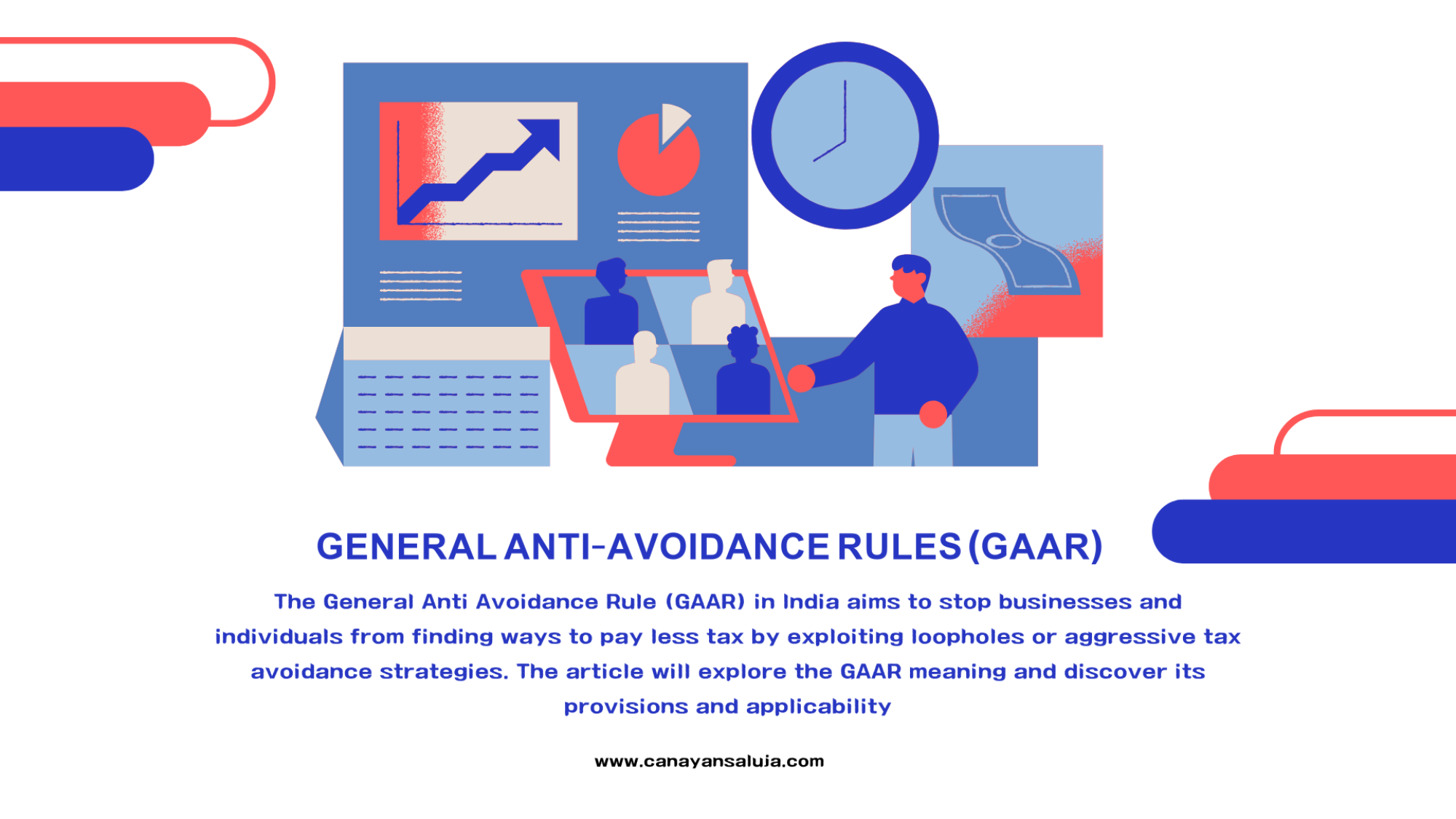GENERAL ANTI-AVOIDANCE RULES (GAAR)
The General Anti Avoidance Rule (GAAR) in India aims to stop businesses and individuals from finding ways to pay less tax by exploiting loopholes or aggressive tax avoidance strategies. The article will explore the GAAR meaning and discover its provisions and applicability.
SECTION 95: APPLICABILITY OF GAAR
GAAR provides that an agreement entered into by an assessee may be declared to an impermissible avoidance agreement (IIA) and the consequences in relation to tax arising there from may be determined as the provisions of this chapter.
The section starts with a non obstante clause which means, if there is a conflict with provisions in other sections, then this section shall prevail over other conflicting provisions.
SECTION 96: IMPERMISSIBLE AVOIDANCE AGREEMENT
Impermissible avoidance agreement means an arrangement which satisfies two conditions:
1. Main purpose/ one of the main purposes of which is to obtain a tax benefit; and
2. It:
|
TRANSACTIONS SHALL BE DEEMED TO LACK COMMERCIAL SUBSTANCE |
||
|
S.NO |
NATURE OF TRANSACTION |
EXAMPLE |
|
1. |
Substance of the transaction differs significantly from its Form |
A transaction has been stated to be sales and lease transaction, but in substance it is only a make and believe story. |
|
2. |
The only purpose of selection of such Location of asset/ transaction/ place of residence of any party is to obtain tax benefit and there is no substantial commercial purpose for selecting such Location of asset/ transaction/ place of residence of any party. |
A transaction between A Ltd. of Netherlands and B Ltd. of Hong Kong is executed through a conduit C ltd in a Tax Heaven. |
|
3. |
Arrangement does not significantly affect business risk/ net cash outflows of any party to the arrangement but only attributes tax benefits |
X. ltd located in tax holiday area take a Plant & Machinery on rent of Rs. 4 Crores from sister concern and given it on rent to another sister concern for rent of Rs. 10 crores. |
|
4. |
Transaction involves: |
|
|
i. |
Round Tripping, which includes any arrangement in which, through series of transaction: – (a)Funds are transferred among parties.
(b)Such transactions have no substantial commercial purpose other than obtaining tax benefit.
It is irrelevant that: • Funds involved in round trip financing can be traced to any funds transferred/ received (direct nexus not relevant).
• Time or sequence in which funds are transferred/ received.
• Manner/ mode in which funds are transferred/ received.
|
(a) A group company in profit, obtains loan from market and gives loan to sister concern interest free; and claims it to be for business purposes.
(b) A company (X. Ltd.) purchases shares of group company, from another group company at a high value and sells it to another group company at low value. This result in a loss to X ltd. This transaction can be vice versa.
(c) A group company in profit, obtains loan from market. Uses the loan for business, and gives loan to sister concern out of own funds (direct nexus not relevant). |
|
ii. |
An accommodating party i.e. a party, the main reason for whose participation is to obtain (directly or indirectly) a tax benefit. It is irrelevant that the accommodating party is associated person or not. |
A ltd. sells shares to subsidiary company B ltd. at a lower value and books a loss (A ltd. wanted a loss) B ltd. transfers the shares at higher value in the market and books a profit (Subsidiary wanted a profit). Here B ltd is the accommodating party. |
|
iii. |
Elements have the effect of offsetting or cancelling each other |
|
|
iv. |
A transaction conducted through one or more persons and disguises the value/ location/ source/ ownership/ control of funds |
A share capital is invested in India by a company in Mauritius, the source of investment is not disclosed. |
|
Further, it has been provided that following shall be irrelevant for deciding whether a transaction lacks commercial substance or not: – • Period/ time for which arrangement exists.
• Fact of payment of taxes, directly or indirectly, under the arrangement.
• Fact that an exit route (including transfer of any activity/ business/ operations) is provided by the arrangement.
While treating a transaction as Impermissible Avoidance Arrangement (IIA) • An equity may be treated as debt or vice versa.
• Capital receipt may be treated as revenue receipt or vice versa.
• Expenditure/ deduction/ relief/ rebate any may be recharacterized.
|
||



Add a Comment